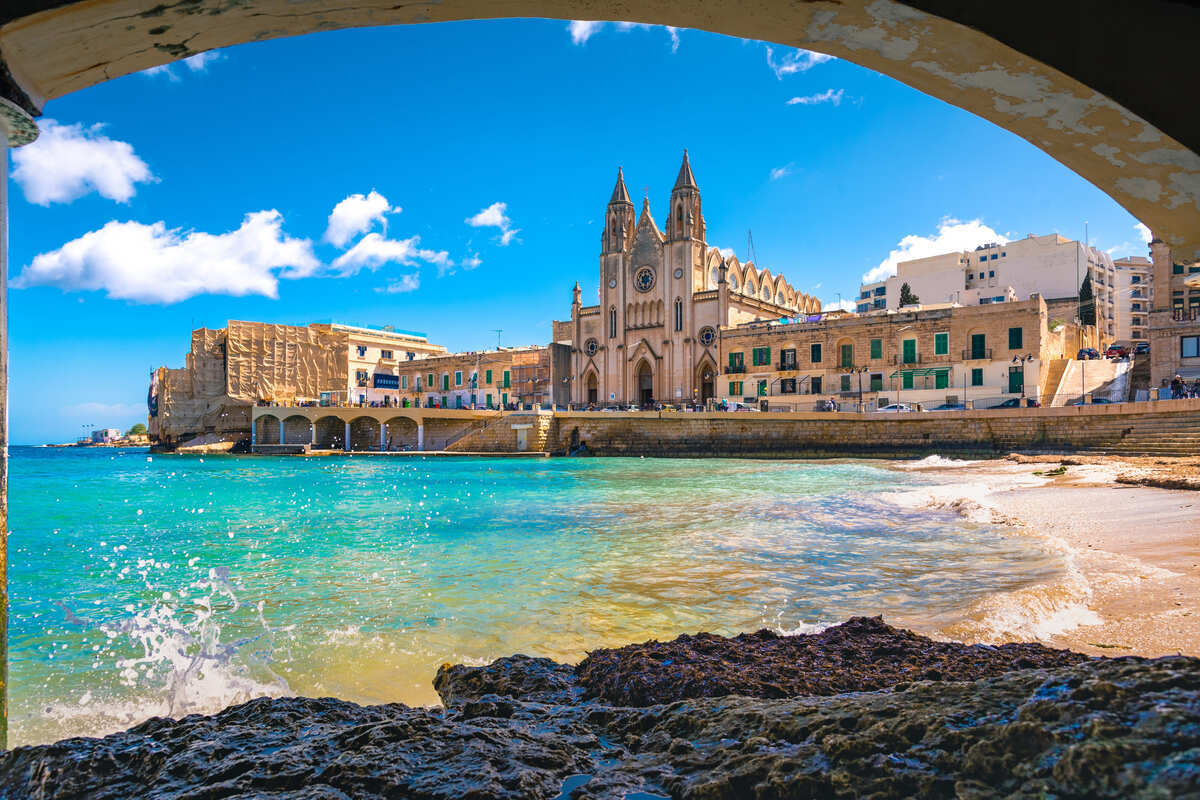
These Are 4 Of The Most Incredible Mediterranean Destinations For Digital Nomads
Last Updated
Digital nomads have been flocking to the Mediterranean lately, and as part of the community myself, I totally get it.
We’re drawn to the long hours of sunshine, the delectable food, the fascinating History, and most importantly, the quality of life.


You may get warm waters in the Caribbean and gorgeous nature in Asia, but the Med has all that, plus higher living standards and safety.
And let’s face it, you won’t easily find beaches hemmed by cobbled towns and medieval fortresses anywhere else.
There is nowhere quite like the Med, but where will nomads find not only the most beautiful scenery and greater cultural offer but also good value for money?
According to Nomad List, the authority in tracking digital nomad trends, these 4 incredible spots are some of the best-loved currently in the Ancient Sea:
Sliema, Malta


For those of you who might have never heard of it, Malta is a tiny island nation located just south of Sicily (the Italian island featured on HBO’s hit series White Lotus), and other than a multitude of Baroque churches – one for each day of the year, to be precise – and ocher-colored citadels, it is home to Sliema.
Malta is treated as a single conurbation—as the island is so small, you can never tell where one town ends and another begins—but it doesn’t take a genius to figure out which one is Sliema.
Just look for the solitary cluster of high-rises across the bay from Valletta and follow the young crowds.


Contrary to Valletta, the medieval capital, or the historic walled city of Mdina, both designated heritage sites, Sliema is Malta’s experiment with 21st-century city-building.
It has wider streets, not narrow alleys, modern structures, as opposed to historic cathedrals, and a noticeable youthful atmosphere.
It is one of a handful of nightlife spots in the country, and its rapidly-developing boardwalk lined by cafes make it an incredibly exciting place for Malta-based nomads to be in: as Nomad List members confirm, it is ‘good’ fun, and it’s not as expensive as you might think.


You will spend an average $3,145 per month in Sliema, though it can be a lot cheaper if you’re intent on reducing costs by eating cheap or cooking at home most nights, and staying in non-luxurious accommodation. Either way, three grand is an ‘ok’ figure for most nomads.
Sliema is also well-connected to other parts of the island – Valletta is a short 15-minute ferry crossing away across the bay – and you can walk to trendy St. Julian’s as it’s only 1.2 miles.
Catania, Italy


Remember Sicily, Malta’s close neighbor?
As it turns out, its second largest conurbation, the sprawling Mediterranean metropolis that is Catania, is trending on Nomad List, too, lauded for its balmy temperatures – even in spring – historical value and lack of crime.
Sicily is the mafia hotspot of Italy – it’s no wonder cult classic The Godfather was filmed here – but there’s absolutely no reason for nomads to fear for their safety, as similarly to Mexico, much of the warring takes place away from the public eye, and never involves innocent foreigners.


In Catania, for instance, your primary concerns are not getting hit by a vintage vespa, as traffic can get a tad chaotic at peak hours, beware of pickpockets, as customary around Italy, and a potent Mount Etna eruption:
Don’t worry too much about the latter, as the last time the menacing volcano at the edge of Catania’s metropolitan zone wreaked actual havoc was 96 years ago, so except for those, this is an incredibly promising nomad hub.


Dating back thousands of years, it’s a cultural center of the first order, as well as a getaway to Sicily’s East Coast, lapped by sands that are powder white and turquoise seas, and a vibrant city that never sleeps with an active nightlife – mostly at weekends.
As for nomad infrastructure, there are plenty of coworking centers and work-friendly cafes to choose from, with the aptly-named Verso Coffice and the casual Caffè Opera drawing in an international clientele, and you’ll be glad to know Catania is among the cheapest cities to live in Italy:
Nomads spend roughly $2,957 per month here.
Bar, Montenegro


We know Montenegro is not everyone’s first pick of a nomad hub, seeing it’s harder to get to as flight options are more limited, and it’s just not as popular as other Med competitors, but you definitely don’t want to miss out on beautiful Bar.
Lining the shores of the Adriatic, a subregion of the Mediterranean, it is a mid-size city just over 40,000 permanent residents call home and the leading beach destination in Montenegro, thanks to its plethora of spa resorts, pristine beaches, and thriving social scene.


It enjoys year-round warmer weather, with temperatures rarely dropping below 60.8°F in spring, and it definitely feels livelier, not frozen in time compared to other Montenegrin harbor towns like Kotor and Budva, even though it is just as old.
Bar’s triumph lies in its combination of Ancient World and resort town aesthetics.
Stari Bar, a few miles outside the development zone, is a millennia-old stone-built settlement preserving its traditional character, while Sutomore is a leisure hotspot famous for its mile-long sandy beach and buzzing bars.


Costing only $1,716 to live, due to Montenegro’s lower consumer prices and generally affordable cost of living, Bar is one of the least-expensive Mediterranean destinations, and it certainly helps that Montenegro is not yet part of the European Union.
Speaking of which, nomads can stay in Montenegro for three months independently of time spent in Europe’s dreaded Schengen Area, or any European country for that matter, making it an even more enticing option.
Valencia, Spain


Already dubbed the best expat destination in the world, Valencia is wooing the digital nomad community with its high standards of living at affordable prices and immutable sunny weather.
Spring has barely started, yet it is already 69.8°F in this exciting coastal spot.
Other than the usual nomad cafes, and the myriad of cowork offices you can expect from a highly-developed city like Valencia, it is one of those places that will bring out the culture buff in you, even if you don’t care for History all that much.


It is simply everywhere to be seen, from the preserved Historic Quarter and its Serranos Tower to the Gothic-style Lonja de la Seda, a civic building dating back to the Middle Ages, and every other minor medieval landmark in between.
Spanning 420 acres, the Historic Quarter is one of the largest not only in Spain, but all of Europe, and its storied Baroque buildings and narrow streets provide a unique contrast with Valencia’s more modern waterfront, particularly the City of Arts and Sciences.


Considered one of the 12 Treasures of Spain, the country’s equivalent to the 7 Wonders of the World, this architectural complex houses an IMAX Cinema, a planetarium, an interactive science museum, a landscaped walk flanked by exotic aromatic plants, and even an opera house.
It is the enduring proof Valencia is firmly planted in 21st-century innovation, all the while not forsaking its ancient roots:
It may be a big regional capital, but it still feels calm, as no one seems to be in a rush to go anywhere, Past and Present coexist in the same plane, there are sandy beaches a short 20 minute drive away, and affordability-wise, it costs an average $2,057 to call home.
↓ Join Our Community ↓
The Travel Off Path Community FB group has all the latest travel news, conversations, and Q&A’s happening daily!


SUBSCRIBE TO OUR LATEST POSTS
Enter your email address to subscribe to Travel Off Path’s latest breaking travel news, straight to your inbox.
This article originally appeared on TravelOffPath.com
Opinions expressed here are the author’s alone, not those of any bank, credit card issuer, hotel, airline, or other entity. This content has not been reviewed, approved or otherwise endorsed by any of the entities included within the post.

